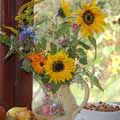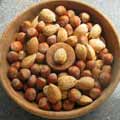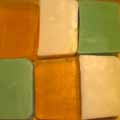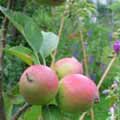

(Lighter) Footprints ! - First Spring IssueHere (at last) is the first issue of "Footprints!" the Greenfootsteps e-zine.I realised after I named it that it should really be "Lighter Footprints" as that's really the name of the game! What's in a name? I'm sure everyone reading this will understand the quest to lighten our load upon the planet. That's why you are here, right? Anyway, a very warm welcome to the first issue of (Lighter) Footprints! - and apologies to anyone who nearly deserted because this first issue was so slow in coming! I hope that you will find plenty to give you more food for thought about green living and even the odd entertaining snippet, too. This issue is devoted to some spring green living tips. How is it organised?Very simply: First there is Site Update News which does just that: all the new pages since the last newsletter. Then there's Tips Updates. These are new tips that I've found - some will have been added to pages and some will be completely new. Next there's a very brief piece on What's in the Greenfootsteps Pipeline. Lastly there's some interesting links and snippets which might interest you from around the web - and around the world.
Site Update NewsSo here's the Site Update NewsIn Green Grow there's a new page on how to grow garlic - very easy and simple. You can even use a planter or window box! Green Clean has a new page on borax. This is a versatile and powerful cleaner, one that's well worth getting to know. There are tips on safety and usage and where to buy it. In Green Kitchen is a page on gourmet salts. These are a great aid to healthy living and many of the industries producing them are relatively low-tech and green. And of course gourmet salts are a lot tastier than most conventional table salts! In Green Garden there's a new page on organic lawn care which gives you some simple tips on keeping your lawn in good shape and details some of the products which you might find most useful for growing an enviably green and weed-free lawn. There's also a new page on home energy saving devices which has some info from a previous page (about CFLs and LED lights) which you may have already seen. But it's got completely new info on several useful gadgets for keeping your home electricty bills down. This page will expand as I find more useful gadgets - more are coming onto the market all the time. There are also some newish pages on toothpastes and tooth whitening which you may not have seen if you haven't visited for a while. You can also learn how to make your own cheap and effective toothpaste. These pages are to be found in Green Body
Tips UpdateCutting down on detergentDid you know that you can make your own detergent very easily with grated soap and a little borax and washing soda? I was very impressed with the power of borax. I've already written a page on using salt and soap to replace detergent for when you run out. Another way to replace the washing powder (and the harmful phosphates and fragrances they contain) is to use washing soda and borax with a little simple soap. Grate some soap into your powder drawer on the machine and add a dessertspoonful or so of borax and one of washing soda. This works really well and is quite inexpensive. In fact, you don't strictly need the borax! I've washed quite a few loads with just a little soap and some washing soda - about a tablespoonful. Washing comes out clean and fresh-smelling. If you are in the UK, Holland and Barret do wonderful pure olive oil soap for about 85 pence. Coffee grounds - a useful resourceHave you tried feeding your household plants with coffee grounds? Coffee dregs are quite rich in nitrogen and can work well as a plant feed. Just dilute the dregs down so that they are a pale brown - like weak tea - and give your houseplants a drink every week or two. Don't completely rely on coffee grounds as it may not have quite enough nutrients to supply everything your plants need. They do supply a good amount of magnesium and copper. Use coffee dregs outside, too. Sprinkle them around plants, especially the acid-loving ones. Discarded vegetable water is also a valuable feed for houseplants. Starbucks will give used coffee grounds for free - they even pack them up for you, I believe. If you've got a worm bin, coffee and tea dregs are much appreciated by the wee critters. Bread making tipsFor anyone who has tried to make homemade bread and has succeeded in making fire-bricks, here are a few good bread making tips. Use as much water as you can without the bread becoming unmanageably sticky. This results in a more open texture. Rest the mixture for a few minutes to allow more of the water to be taken up by the flour. Wholemeal flour needs slightly more water than white. Don't leave your bread to rise for too long. It should approximately double in size. If you leave it too long the resultant bread may be too crumbly. It's also quite important that the room is warm enough for a good rise. After knocking down the first rise, finish working the bread by stretching it into its final shape. If the top of the bread is well stretched over the body of the bread this prevents the gases from the yeast from escaping too easily. The bread will be lighter. Make sure that your bread goes into the oven when it's fully up to temperature. If you put it in early it will tend to not cook properly and may end up soggy in the middle. Make sure your yeast is fresh. Try it some in warm water if in doubt. If it does not start to bubble within a few minutes, discard it and buy some new. Eat up your spuds!The beautiful yellow wagtail is declining in numbers and the lack of potato crops is partly to blame. Yellow wagtails like to nest on the ground. Their second nest of the season tends to be in broad bean and potato crop fields and this second brood is essential if numbers are to be maintained. They've lost 65% of their numbers since the 1970s in the UK. You can learn more at www.birdtrack.net Ditch the peat!Or rather keep the peat - where it is. A new study shows that peat is a useful carbon sink. A UK government agency, Natural England reckons that around 41,000 tonnes of CO2 a year are absorbed by British peatlands - but only if they are left in pristine condition.
What's in the Greenfootsteps Pipeline?There will soon be an opportunity for anyone who wants to contribute tips and green living ideas. This will be an easy to fill in box on a few pages. Anything you write goes live on the web. Greenfootsteps retains the right to remove anything inappropriate or offensive; otherwise you are free to contribute as you please.Advertising on Greenfootsteps will soon be easy as there will be a section devoted to it. Ads will be very reasonably priced to make them attractive to small green companies. There should be new pages on driving - tips for safety and reducing fuel use and seaweed before long. Seaweed is a most valuable food and provides masses of nutrients. There will also be some reviews of some of the products of bigger brands of green skin care. Again anyone who would like to review a product for us is more than welcome.
New initiatives and interesting websitesHere's a company which is developing extremely efficient fuel cell technology which will hopefully be available in the next year or two. Maybe it's time to hold off from buying that new car just yet! Horizon Fuel Cell CarAnd here's the amazing air car: Zero Pollution Motors "Since the Air Car is running exclusively on compressed air, it emits only air - zero pollution. The air expelled from the tail pipe is actually cleaner than the air used to fill the tank." It's soon to be launched in the US. According to Compassion in World farming, nearly half Britain's egg sales are now for free-range eggs. Hellman's mayonnaise is going free-range from June and a Cambridge college (Pembroke) is going free-range, too. Check it out here: The Good Egg Awards and here at Free Range Review Global warming is causing the artic ice cap to melt at an unprecedented rate. If you would like to learn more, see: this New Scientist article or watch this Youtube video at Global warming - cause and effect on the Greenfootsteps site. That's it for this time. I hope you've enjoyed the first issue of Footprints! I hope to be able to do the next one in May. See you then! Rona New! CommentsHave your say about what you just read! Leave me a comment in the box below. |
ContactWhat's here
What our readers say...
I've just fallen into your website and wanted to say how great it is!! I've got a lot of cheap ideas and when you're on a tight budget - that's vital! - Gail, NZYour site has been an exceptional resource as I have sought to modify my lifestyle. - Art, US
Just a big thank you for all the info! - Estelle, US
Loved your simple, clear approach. Thanks for the many great tips.- Laura, AUS
I found your Web site fascinating... - Steve, US






